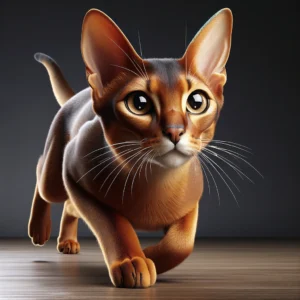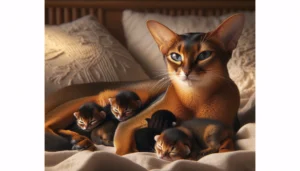Abyssinian Cat
Everything You Need to Know About Abyssinian Cats
Abyssinian cats are one of the oldest and most fascinating domestic cat breeds, known for their elegant appearance and active, playful behaviour. In this article, we’ll delve into everything you need to know about Abyssinians, covering their history, physical characteristics, behaviour, care, interaction with children, breeding, gestation, and more.
History of the Abyssinian Cat
The origin of the Abyssinian cat is a subject of debate among enthusiasts and historians. While the name suggests a connection to Abyssinia (now Ethiopia), genetic evidence and documented history indicate that Abyssinians may have been developed in Britain, possibly through British Shorthairs and cats imported from Southeast Asia. Abyssinians were first exhibited in England in the 1870s and quickly gained popularity for their exotic appearance and charming personality.
Physical Characteristics of the Abyssinian
General Appearance
The Abyssinian is a medium-sized cat, known for its elegant, athletic build. Its body is muscular yet slender, allowing it to be exceptionally agile and quick. This breed stands out for its wild appearance and unique coat, which gives it a “wildcat” look.
Coat and Colours
One of the most distinctive features of the Abyssinian is its “ticked” coat. Each hair has several bands of colour alternating between light and dark tones, resulting in a coat with unique shine and depth. The most common colours include ruddy (reddish-brown), sorrel (cinnamon), blue, and fawn.
Eyes and Expression
Abyssinians have large, almond-shaped eyes that can range in colour from gold to green, giving them an alert and lively expression. Their bright, expressive eyes are one of the breed’s most appealing features.
Ears and Head
The head of the Abyssinian is slightly wedge-shaped, with large, pointed ears that are well-spaced and forward-facing. This ear placement gives the cat an inquisitive and attentive appearance.
Personality and Behaviour of the Abyssinian
Temperament
Abyssinian cats are known for their active, curious, and extremely playful personalities. They are intelligent and energetic cats, needing plenty of mental and physical stimulation.
- Active and Curious: Abyssinians are highly active and enjoy exploring their surroundings, climbing, and jumping. They love heights, making cat trees and elevated spaces ideal, as they enjoy observing everything happening around them.
- Sociable and Affectionate: Although independent, Abyssinians are very sociable and enjoy human company. They like interacting with their owners, following them around the house, and taking part in daily activities.
- Intelligence: They are incredibly intelligent and can learn tricks or play interactive games. They enjoy problem-solving, meaning they’re drawn to toys that challenge their minds.
Activity and Play
The Abyssinian is one of the most active cat breeds. They require plenty of exercise and mental stimulation to stay happy and healthy. They love playing with interactive toys and enjoy games that allow them to hunt and chase. Climbing structures and cat trees are ideal for keeping them engaged.
Intelligence and Curiosity
These cats are exceptionally intelligent and can learn tricks and basic commands. They enjoy solving problems and are attracted to toys that challenge their minds. Their natural curiosity can lead them to open doors and drawers, so it’s essential to ensure their environment is safe.
Interaction with Children and Other Pets
With Children
Abyssinian cats make excellent companions for children. Their playful and active nature makes them ideal for households with children who can provide them with plenty of interaction and play. However, it’s important to teach children to treat cats with respect and not be too rough.
With Other Pets
Abyssinians generally get along well with other pets, including other cats and dogs. Their sociable and curious nature allows them to adapt well to multi-pet households. However, introductions should be done gradually to ensure all pets feel comfortable.
Care and Maintenance of the Abyssinian Diet
A balanced, high-quality diet is essential for keeping an Abyssinian healthy. Given their high activity level, they need protein-rich foods to maintain their energy and muscle mass. Consult your vet to determine the best diet for your Abyssinian, ensuring it includes high-quality protein and essential nutrients.
Grooming
The Abyssinian’s short coat requires minimal maintenance. A weekly brushing is sufficient to remove loose hair and keep their coat in good condition. It’s also important to check their ears regularly and keep their nails trimmed.
Health and Vet Check-ups
Abyssinians are generally a healthy breed, but they may be prone to certain health issues. Regular vet check-ups are important to catch any potential health problems early. Some conditions they may be susceptible to include:
- Periodontal Disease: Abyssinians are prone to dental issues, so dental hygiene is essential.
- Progressive Retinal Atrophy (PRA): A genetic condition that can lead to blindness.
- Pyruvate Kinase Deficiency (PKD): A genetic disease causing anaemia.
Maintaining a regular vaccination and deworming schedule is crucial for their well-being.
Breeding and Reproduction of the Abyssinian
Selecting Breeders
If you’re interested in breeding Abyssinians, it’s crucial to select responsible and ethical breeders. Ensure that breeders follow proper breeding practices and that the cats are in good health. A deep understanding of the breed’s genetics and health is essential to avoid hereditary issues.
Gestation
Gestation in Abyssinian cats lasts approximately 63–65 days. During this period, it’s important to provide the pregnant cat with proper nutrition and a calm, safe environment. Regular vet visits will ensure the pregnancy progresses smoothly.
Kitten Care
Abyssinian kittens require special care during their first few weeks of life. It’s important to provide a warm, secure environment and ensure they receive proper nutrition. Early socialisation is crucial to develop a balanced and friendly temperament. Kittens should be handled gently and exposed to different stimuli to help them grow into well-adjusted cats.
Health and Care
- Health: Generally, Abyssinians are healthy, but like any breed, they can be predisposed to certain genetic conditions, such as pyruvate kinase deficiency (PKD) and dental issues. Regular vet check-ups are essential.
- Coat Care: Their short coat requires minimal maintenance, but weekly brushing will help keep it in good condition and reduce shedding.
- Exercise: As highly active cats, they need plenty of exercise. Ensure they have toys and activities to help expend their energy.
Life Expectancy
The life expectancy of an Abyssinian cat is typically between 12 and 15 years, though some can live longer with proper care.
Environmental Enrichment and Stimulation
Vertical Spaces
Given their love for climbing and exploring, providing Abyssinians with access to vertical spaces is beneficial. Cat trees and shelves designed for climbing offer them the exercise and stimulation they need.
Interactive Toys
Interactive toys that challenge the Abyssinian’s mind are ideal for keeping them entertained. Food puzzles and toys that mimic hunting can keep your cat mentally stimulated and physically active.
Playtime
Spending time playing with your Abyssinian will strengthen your bond and help keep them happy and healthy. Chase games with feather toys or laser pointers are particularly effective for satisfying their hunting instincts.
Preventive Health and Wellbeing
Vet Check-ups
Regular vet visits are essential for the long-term health of your Abyssinian. These visits help identify any health issues early and keep vaccinations and parasite treatments up to date.
Dental Hygiene
Maintaining dental hygiene is crucial to prevent periodontal disease. Regular tooth brushing and the use of dental toys can help keep your cat’s dental health in check.
Weight Control
As Abyssinians are an active breed, they are unlikely to suffer from obesity if they get enough exercise. However, it’s important to monitor their diet and provide high-quality food to maintain an ideal weight.
Behaviour and Communication
Vocalisation
While not as vocal as Siamese cats, Abyssinians can be quite communicative. They use a range of sounds to express their needs and emotions, from soft meows to purrs.
Body Language
Understanding your Abyssinian’s body language is key to a good relationship. Observe the positions of their ears, tail, and eyes to better understand their mood and needs.
Modern History and Popularity
Recognition in Shows
Abyssinians have gained popularity in cat shows for their beauty and unique characteristics. They’ve won numerous awards and titles in competitions worldwide, standing out for their elegance and grace in the ring.
Role in Popular Culture
Abyssinians have appeared in various works of popular culture, including films, books, and TV shows. Their exotic appearance and charming behaviour have made them a captivating breed for many.
More About the Abyssinian Cat
The Abyssinian cat is truly an extraordinary breed, not only for its appearance and behaviour but also for its rich history and specific care needs. Loyal, intelligent, and playful, they make excellent companions for families and multi-pet households. By understanding and meeting these needs, you can ensure your Abyssinian leads a happy and healthy life.
From daily care to social interaction and fascinating history, Abyssinians continue to capture the interest and love of cat enthusiasts worldwide. When adopting or breeding an Abyssinian, you become part of a rich tradition of appreciation for one of the oldest and most revered cat breeds in the world.
The Abyssinian cat is one of the oldest and most distinctive domestic cat breeds. Here is a detailed description of its characteristics and essential facts:
Origin and Physical Characteristics
- Origin: Abyssinian cats are believed to have originated in Ethiopia (formerly known as Abyssinia), though some suggest they may have Egyptian roots.
- Physical Appearance: They are medium-sized cats, slender yet muscular, with an elegant and athletic appearance. They have a wedge-shaped head, large, pointed ears, and almond-shaped eyes that are green or amber in colour.
 Coat:
Coat:- Short and Soft Coat: Their coat is short, dense, and soft to the touch. One of their most notable features is the “agouti” marking, which consists of bands of different colours on each hair, giving them a speckled or striped look.
- Colours: The most common colours are sorrel (rich red), blue (grey), ruddy (dark brown), and fawn (light beige).
Personality
- Active and Curious: Abyssinians are known for being active, curious, and energetic. They love exploring their surroundings and playing, so they require mental and physical stimulation to stay happy and healthy.
- Sociable: They typically get along well with other cats and dogs, as well as with family members. They enjoy interaction and attention but also value their independence.
Breeding and Care:
- Breeding: Abyssinian kittens are usually born after a gestation period of around 63–68 days. They are generally resilient and do not tend to suffer from major health issues.
- Care: They require regular brushing to keep their coat in good condition, though they are not prone to matting. They also need daily exercise and mental stimulation to prevent boredom.
- Diet: A balanced, high-quality diet is essential for their health. It’s recommended to provide a mix of dry and wet food, along with fresh water always available.
Longevity:
Abyssinians typically have a lifespan of 12 to 15 years, though many can live longer with proper care.
In summary, Abyssinian cats are a unique and beautiful breed, known for their speckled coat, active personality, and curious nature. They are affectionate and playful companions who can adapt well to various environments as long as they receive proper care and attention.
See More Breeds


